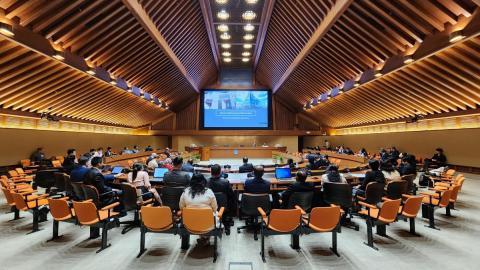
Last week, Syslab joined the UN-SPIDER International Workshop “Space-based Technologies for Disaster Risk Reduction - Assessing the Unseen Risks”, which was co-organized by the United Nations Office for Outer Space Affairs (UNOOSA)/UN-SPIDER and United Nations Economic and Social Commission for Asia and the Pacific (UNESCAP), in collaboration with the Ministry of Emergency Management of the People’s Republic of China, the Asia Pacific Space Cooperation Organization (APSCO), the Asian Institute of Technology (AIT) and the Geo-Informatics and Space Technology Development Agency of Thailand (GISTDA). The workshop took place in Bangkok, Thailand, on 7-9 December 2022, and brought together a diverse group of experts and practitioners in the field of disaster management and geospatial information.
A number of issues were discussed throughout this three-day workshop, addressing such topics as understanding and assessing unseen risks, multi-hazard early warning, assessing threats to ecosystems and nature-based solutions for building disaster resilience, advances in Earth observation and allied technologies to cater needs of the end-users, and so on. A special session was dedicated to the demonstration of the cloud processing environment of the International Charter Space & Major Disasters (ESA Charter Mapper interactive demo of cloud platform), presented by the European Space Agency (ESA).

At this workshop, CEU was represented by Professor Viktor Lagutov from the Department of Environmental Sciences and Policy, and Anastasia Kvasha, a Postdoctoral Fellow at the Department. As part of the session on “Effective Emergency Response”, Anastasia presented some findings from her recently completed PhD dissertation on challenges and prospects in the application of space-based information and technologies for disaster management. The presentation highlighted the work done in analyzing activations of the selected satellite-based emergency mapping mechanisms – International Disasters Charter, Copernicus Emergency Management Service, and Sentinel Asia.
Through such workshops, the UNOOSA's UN-SPIDER programme connects the disaster management community and geospatial data providers and develops programmes to help developing countries to use space-based information in all stages of disaster management.